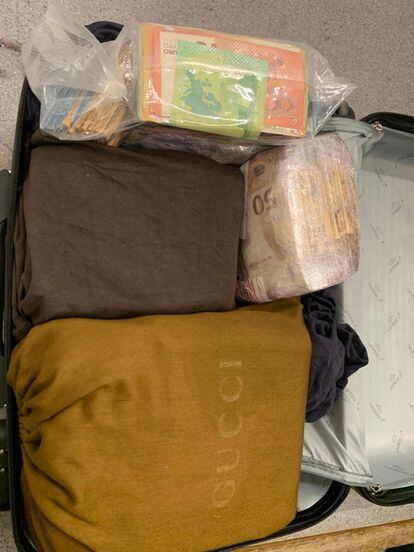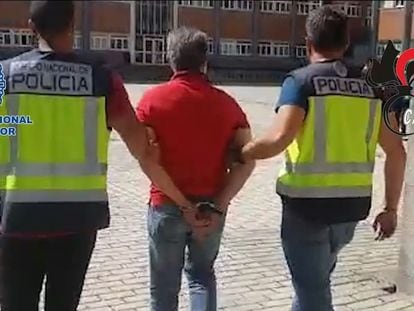Spanish police eye huge sums of cash being taken to The Gambia by immigrants from across Europe
Passengers declaring the funds at Barcelona airport say they are meant for relatives back home, but investigators suspect that criminal organizations may be using the route for money laundering
/cloudfront-eu-central-1.images.arcpublishing.com/prisa/ZUAB7VPGRBH6VHYV7DYLJPMBBY.Jpg)
Flight VY7574 from Barcelona to Banjul has two separate lines of passengers. One line is for boarding the plane, and the other one is for declaring items to customs officers.
Hours before the flight, dozens of people are waiting patiently in line to declare the money they are taking to the capital of The Gambia. They take cash-filled envelopes from their belt bags, the employee counts the money with a machine, the passengers fill out the E1 form and walk over to the boarding gate.
Gambian immigrants living across Europe routinely use these flights departing from Spain to take money back to their home country. “Before the pandemic, we occasionally had so many passengers waiting to declare that the flight had to be delayed. We’re talking about 30 to 40 people in just one morning,” says David Sánchez, head of the customs office at Barcelona’s El Prat airport.
Statistics show that The Gambia is the top destination for all currency taken out of Spain
The Barcelona flight, which is operated by Vueling, is the only direct link between continental Europe and The Gambia, which explains why Gambians from all parts of the continent come to the Catalan capital to catch it.
On July 31, 15 passengers declared currency worth a collective €255,885. Muhamadou Darboe, 50, who works in metal carpentry in Santa Coloma (Barcelona), was carrying an envelope with €11,500 and said most of it was given to him by Gambian friends in Catalonia so he could distribute it among relatives back home. “When I get to my village, Dembacunda, I will call people up and they will come to my house to collect it,” he said.
Other passengers gave other reasons to justify the cash they were carrying – from funding a relative’s trip to Mecca to building a house in their home village.
Any passenger taking more than €10,000 in cash has the obligation to declare the money to customs. The procedure does not involve paying taxes or fines of any kind. Statistics show that The Gambia is the top destination for all currency taken out of Spain. The year 2019 set a new record following a decade of growth: 2,179 Gambian passengers took €73.4 million out of Spain, according to customs sources.
International organizations that fight money laundering believe that The Gambia is a high-risk country in terms of drug and medication smuggling, arms trafficking and illegal immigration
This amount does not reflect the small volume of trade between both countries. Spain exports €23.5 million of goods to The Gambia a year, while imports are less than €4 million, according to the Foreign Ministry. The second top destination for money leaving Spain is Germany.
International organizations that fight money laundering believe that The Gambia is a high-risk country in terms of drug and medication smuggling, arms trafficking and illegal immigration. Investigators who have analyzed the currency traffic between Spain and The Gambia believe there is an organized criminal structure in place to export money presumably obtained through criminal means, according to a high-ranking official at the Tax Agency who spoke to EL PAÍS.
Interpol supports this theory. A 2018 report by the Organisation for Economic Co-operation and Development (OECD) called Illicit Financial Flows found that the physical movement of money across internal borders in the region or with other regions could be linked to organized criminal activity.
Since 2017, customs officers have been conducting random searches on these Barcelona flights to Banjul. Investigators suspect there is an organization that is using people to carry the cash. The currency does not come from Spain alone, but from countries all over Europe. A few years ago Europol issued an alert following a request by Spanish authorities. The first countries to respond were Germany, France, Switzerland and Finland, which all detected large amounts of money being taken out by Gambian passengers.
The passengers on the Vueling flight said that the envelopes contained cash to help their families back home. Investigators offer a different story, and even have a name for these alleged couriers: pitufos (smurfs), whom they suspect of helping criminal organizations launder their money.
The Gambian community in Spain is made up of around 25,000 people, making it Gambia’s largest diaspora group. They are mostly living in the regions of Catalonia and Aragón, where they work mainly in agriculture, construction and the slaughterhouses of Lleida and Zaragoza.

Yundum is the only airport serving The Gambia. It is located halfway between the capital, Banjul, and the beach of Serrekunda, a key destination for international tourism in West Africa. There were 619,000 visitors in 2019, according to the World Bank. The airport terminal was renovated three years ago and it looks impeccable. The first post-pandemic tourism season is underway and there are rigorous Covid controls in place. The airport chief of police, Pamodou Manka, sits in a simple office with a computer on his desk and a portable stove on the floor where he is preparing attaya, a green tea from Gambia. In the office next door, his colleagues are questioning two passengers from the Barcelona flight of August 28. Both men are carrying a €152,000 between them.
“Those two people had Spanish documents showing that they are the owners of that money. What can we do?” asks Manka. “They say that the money is from friends and acquaintances in Spain, to be delivered to relatives. We have to believe them because they are not doing anything illegal here. Ideally Spanish authorities would investigate the origin of the money before handing them a certificate proving possession. They should reinforce control measures on the money that is taken to Africa.”
In late July the police stopped a Gambian passenger carrying €200,000 on a flight from Casablanca in Morocco. The man was unable to justify ownership of this amount, and it was confiscated. Gambian secret services have an eye on Jihadist terrorism even though there have been no attacks in this country.
“The money that comes through the airport could go towards radicalizing people, but it could also be part of drug trafficking and organized crime. Right now we have no more information on the matter, but we’ve started to be on top of them,” says Manka.
The police say that crime is under control, but they admit that there is a Gambian organized crime group that is spread across several European countries
The Gambia is a small country in West Africa with a population of 2.3 million. It is something of an island surrounded by the Atlantic Ocean to the west and Senegal everywhere else. The police there are proud of the low crime rate. The typically dangerous business of buying and selling gold in Africa is a good example: middlemen and buyers have found a safe haven for their deals in The Gambia. Luis M., 50, has spent years visiting the artisan mines in northern Ghana to buy gold, but now he has settled down in The Gambia. “In gold-producing countries of West Africa, such as Mali, Burkina Faso or Ghana, it is very dangerous to do business because you run the risk of having it stolen from you before you reach the airport. That is why many intermediaries like myself have come to The Gambia. You are safe in the knowledge that nobody is going to steal from you here.”
The police say that crime is under control, but they admit that there is a Gambian organized crime group that is spread across several European countries. “Early this year we accepted the extradition of 24 Gambian criminals who were serving sentences in Germany,” says Inspector Manka.
But this apparent peace has a weak spot: Banjul airport, the country’s engine of economic growth, is a smuggling hub. An informal city has sprung up around it made up of traveling market stands, currency exchange booths run by Mauritanian citizens, and tenebrous lodgings, a place rife with prostitution and hucksters and truck drivers waiting around to load their vehicles and be on their way.
Colombian cartels
Groups of smugglers have set up shop at the seaport. Containers come in with everything from cocaine shipments to stolen cars. Interpol has an office on the fourth floor of the central headquarters. The office of Inspector Sulayman Gaye offers views of the ships as they are unloaded. What Gaye is losing sleep over is the smuggling of luxury vehicles from Europe. “Right now we are in the middle of an operation against this kind of traffic,” he says. “We have seized more than 20 cars that were stolen in France and that must be sent back. We have already returned a few this summer. Earlier, those cars were coming in through Dakar in Senegal,” says Inspector Gaye. “But this problem will be tackled because I’m going to be allowed to bring five of my men into the port and this is going to end.”
Colombian cocaine cartels have also infiltrated the port. The police have discovered several containers filled with drugs. And what comes in must go out, notes an entrepreneur who sends containers of fish to Spain and who declined to give his name. He says that mafia groups have offered him money to take drugs into Spain. “At the first meeting they told me they wanted to buy octopus and send it to Galicia [in northwestern Spain]. At the second and last meeting, they offered to include a little gift, between 500 and 1,000 kilos of cocaine. I dropped the business right there,” he says.
English version by Susana Urra.
/cloudfront-eu-central-1.images.arcpublishing.com/prisa/AS2XMTORZRGSXCWXVTGZO7H74Q.jpg)











































